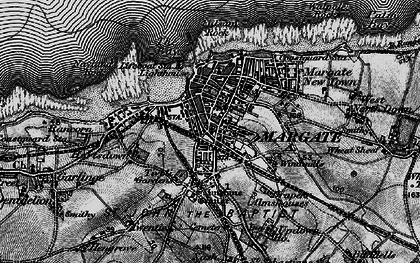Being in SEO has its perks in that can be remote-friendly, agency/company depending of course. I’ve been lucky enough to retain my largely London-based and wider UK-based client pool despite my current area of habitation.
Having moved away from the hustle and bustle of living in London for ten years to a pretty coastal town in Kent, UK, it occurred to me, of course, while sitting in a hustly and bustly cafe in London after a client meeting, that I should experiment with local SEO in my adopted hometown.

Aside from a few small dabblings here and there as well as some ranking and lead-gen success in helping a family member with their website where they lived, I hadn’t actually done a great deal of local SEO myself.
Let me set the scene. The town I live in has a population of about 60,000, has decent links to London and is emerging from its crumbling Victorian seaside tourist stasis into somewhere desirable for erstwhile London (or elsewhere) creatives, tech workers, restauranteurs, families and all such folk.
Now that I’ve externally justified my reasons for moving there (that felt, good?) what about the SEO scene? Are there fellow SEO freelancers or business owners potting around? Any agencies? Any emerging seaside SEO conferences currently taking place above a pub I need to get involved in? Is it worth me helping out some local businesses with their organic presence to get SEO on the map? All these questions span around in my head like trainers in a washing machine as I sipped on my flat white in a trendy Hackney cafe and listened to Neutral Milk Hotel on repeat.
Now of course my humble town certainly isn’t a Brighton, a Bristol, a Cardiff, a Manchester or a Leeds when it comes to having an SEO footprint that manifests itself into a lively, competitive local SERP. Local results may have the odd generalist web services company cropping up, but I wasn’t expecting too much else.
It was then that my living in a naively-wholesome SEO world for the past decade or so caught up with me – I’d forgotten about certain spam tactics. Using a variety of search strings suggested by the Keywords Everywhere plugin, it was shocking what was showing up for generic terms like “SEO services in [location]” and “[location] SEO” etc. This is largely, I assume, because the landscape isn’t competitive.
Scrolling down from what were a few legitimate service providers listed on Google My Business, most of the traditional organic results, save for a couple of boutique agencies in a nearby small city (Canterbury) and a couple pulled in from US cities with the same name (go global?), the traditional organic results were largely auto-completed find and replace keyword-stuffed landing pages that would’ve been spun up in no time.
I’m not going to name and shame, but take a look for yourself. One domain, which again I won’t mention, had a services page that was wide open about selling its local SERP real estate with the query I searched for above (and countless others across UK towns and cities) which was stuffed with placeholder content, admitting to using a “multi-layered system” to conquer local SERPs. Fair enough. I’m wondering if it’s someone from the marvellous world of SEO Twitter who I may have come across previously…
Anyway, I thought I’d fight fire with fire. Enter the web page in question. Like many of the local domains that ranked for my aforementioned search strings, the page took five minutes to spin up, is deliberately stuffed with bolded-out keywords, and was live before you could say The King of Carrot Flowers.
After three days, the page was in position six for the exact match location-based search term I was targeting in the H1 and page title, as well as a few other semantically-similar local search terms I littered around the body content. As of the time of writing, it’s hovering around positions seven to nine. It’s even generated a few local leads. There were no links built, no Google My Business claimed, and I haven’t touched the content (which is largely satirical in tone) since.
Now, this isn’t a not-so-subtle blow of my own trumpet when it comes to my SEO prowess, or at least local SEO prowess. It’s merely an illustrative experiment, or case study if you will, that there’s still so much spam out there and consequently, a lot of opportunities.
Think about other settlements like mine that sit outside the bigger UK cities where the SEO agency landscapes are saturated and it’s hard to compete. Think about the heavily-budgeted CMO as he gets his train into London from somewhere like, say, East Grinstead, or even Horsham or Arundel (can you tell I grew up in West Sussex?) and Googles “SEO services near me”.
Okay, I’m aware the above edge case scenario sounds very glib but I wasn’t sure how else to illustrate my point as well as the findings of this ongoing local SEO experiment in a more appropriate manner.
The point is, creating a genuine, good-quality landing page to capture that local SEO demand and intent from wherever your potential consumers are may be worth the time if the local landscape is either a) spammy or b) ripe for the taking.
Give it a go in your hometown. (Just not Margate, or I’ll set Johnny on you).